Wednesday, July 4th 2018

TechPowerUp Processor Survey Results: The Ryzen Effect is Real
Late May 2018, TechPowerUp started a front-page poll asking people which processor they use. 37 days and 16,140 responses later, we have a general idea of where the desktop processor market stands among our readers (predominantly PC gamers and enthusiasts). The top-two responses to our survey were 4th generation Core "Haswell," followed by the preceding two generations ("Ivy Bridge" and "Sandy Bridge"). This speaks volumes as to the hole Intel dug itself into, due to lack of competition from AMD. Processors that are 4-7 years old still run today's gaming PCs, and don't bottleneck today's games, as long as graphics cards keep getting faster (where there has been relatively more competition than the CPU market).
Despite being newer, fewer respondents use 6th generation "Skylake" and 7th generation "Kaby Lake" processors than older generations, because those on something like 4th generation "Haswell" or even "Ivy Bridge," don't see the value in upgrading. But then something changed in 2017 - AMD became competitive again, and forced an increase in CPU core counts across the segment. AMD's Ryzen processor family, including both its 1st and 2nd generations, are better received in the market than Intel's competing 8th generation "Coffee Lake" and 7th generation "Kaby Lake." The data stands to validate the "Ryzen effect," the idea that the introduction of Ryzen disrupted Intel's near-monopoly, increased core-counts, and brought innovation back to the segment.More of our readers use AMD Ryzen processors than Intel Core "Coffee Lake" and "Kaby Lake." So in the period following Intel's launch of 7th generation "Kaby Lake" (slightly before the launch of Ryzen), more AMD processors were installed among our readers. This of course doesn't mean that there are more AMD users, since we're not counting pre-Ryzen Intel generations such as "Skylake" and "Haswell." This seems to suggest that the "Ryzen effect" is not a myth.In the time since 2nd generation "Sandy Bridge" (circa 2012), very little innovation has been there from Intel for PC gamers. The mainstream-desktop segment has had to content with no more than 4 cores, and there's been very little IPC increments between generations to warrant upgrades. The result is that there are plenty of people with >4 year old processors, which are fast enough for today's gaming. The data also shows that in a shorter span of time, AMD sold more Ryzen chips.Of course there are limitations to our survey. The data is sourced from a user poll among our readers, in contrast to the Steam Hardware Survey, which gets its data by probing the hardware of a machine. As we mentioned earlier, our readers are composed of PC gamers and enthusiasts, and hence our data isn't in line with the general market (that includes other use-cases).
Despite being newer, fewer respondents use 6th generation "Skylake" and 7th generation "Kaby Lake" processors than older generations, because those on something like 4th generation "Haswell" or even "Ivy Bridge," don't see the value in upgrading. But then something changed in 2017 - AMD became competitive again, and forced an increase in CPU core counts across the segment. AMD's Ryzen processor family, including both its 1st and 2nd generations, are better received in the market than Intel's competing 8th generation "Coffee Lake" and 7th generation "Kaby Lake." The data stands to validate the "Ryzen effect," the idea that the introduction of Ryzen disrupted Intel's near-monopoly, increased core-counts, and brought innovation back to the segment.More of our readers use AMD Ryzen processors than Intel Core "Coffee Lake" and "Kaby Lake." So in the period following Intel's launch of 7th generation "Kaby Lake" (slightly before the launch of Ryzen), more AMD processors were installed among our readers. This of course doesn't mean that there are more AMD users, since we're not counting pre-Ryzen Intel generations such as "Skylake" and "Haswell." This seems to suggest that the "Ryzen effect" is not a myth.In the time since 2nd generation "Sandy Bridge" (circa 2012), very little innovation has been there from Intel for PC gamers. The mainstream-desktop segment has had to content with no more than 4 cores, and there's been very little IPC increments between generations to warrant upgrades. The result is that there are plenty of people with >4 year old processors, which are fast enough for today's gaming. The data also shows that in a shorter span of time, AMD sold more Ryzen chips.Of course there are limitations to our survey. The data is sourced from a user poll among our readers, in contrast to the Steam Hardware Survey, which gets its data by probing the hardware of a machine. As we mentioned earlier, our readers are composed of PC gamers and enthusiasts, and hence our data isn't in line with the general market (that includes other use-cases).
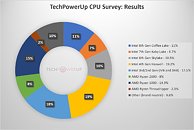
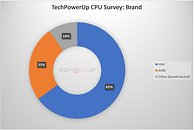
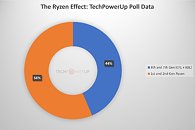
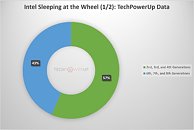
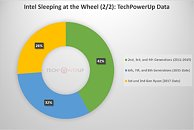

96 Comments on TechPowerUp Processor Survey Results: The Ryzen Effect is Real
Now test real sales numbers outside.
Fortunately forum dwellers are a bit smarter.
Thanks for the insights.
1. we all still remember that under the table dealing Intel had going on for which they got a fine they have yet to pay sooo there is that.
2. guess stuff still takes more time to adjust
And yes, stuff does take time. Hopefully by Zen2's launch adoption will start rising
TPU is not "renowned" for such thing. Nobody is waiting with pitchforks in every AMD CPU thread. All is well.
If Intel does not get 10nm working before or around Zen 2 launch, I could easily see AMD gain much more marketshare :) Higher clocks and improved IPC would attract more gamers/allround users. I use Ryzen 1700 @ 4 GHz in my server - But for my gaming machine fps drops alot in most games compared to my 6700K @ 5 GHz. Not running games at "ultra" tho, so I'm probably more CPU bound than people usually are. I aim for 120+ fps at all times and with Ryzen I saw way more drops and noticeable lower performance, especially in some of my games.
The general consumer is only just coming into contact with current AMD components.
Also, retail only shows what home users typically buy. Yet even back in Netburst days, businesses still bought Intel in droves. Sadly.
6950x is basically junk now btw, see below. (Although many professional workloads still prefer Intel, but this generally is a good indication for more general "consumer" workloads, not adobe creative suite or whatever).
Competition, yeah, as welcome as ever.